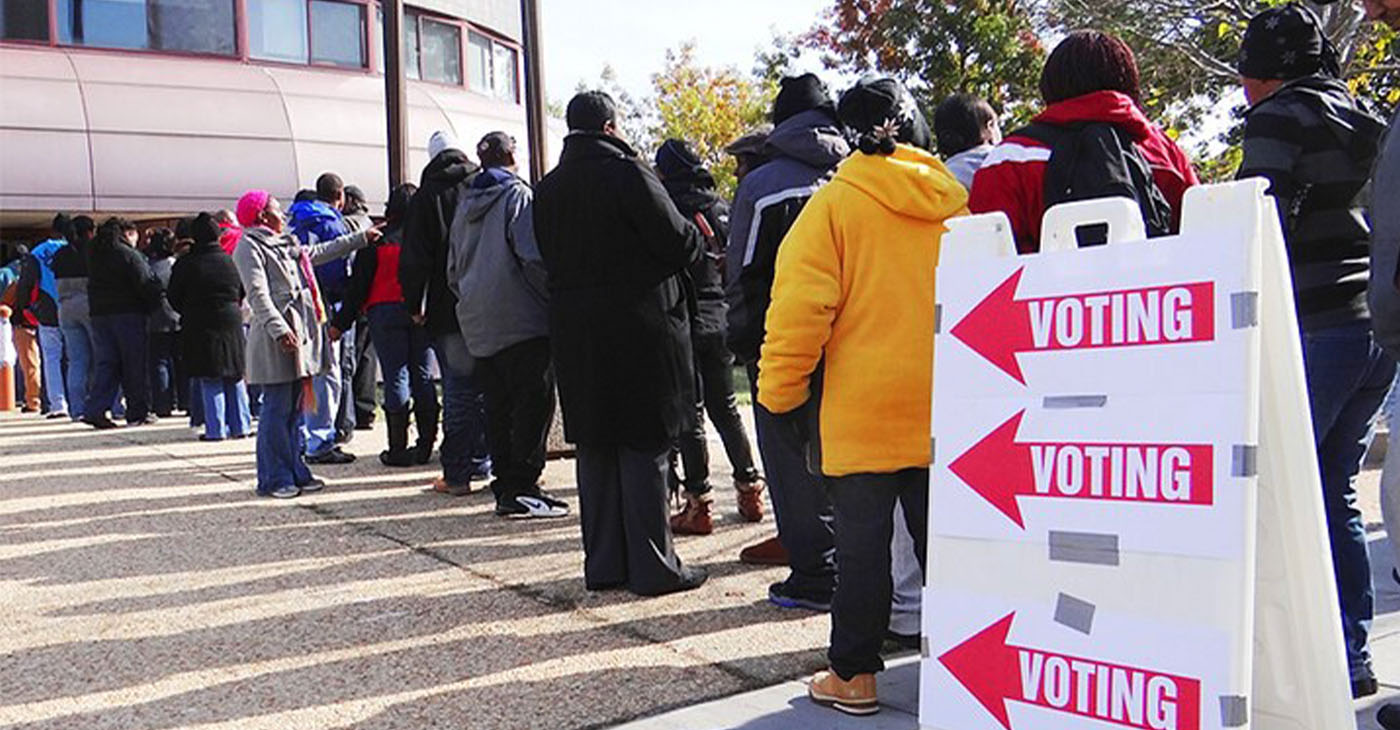National
Blacks Now Finishing High School at Record Levels

In this May 5, 2014 photo, Krishaun Branch, left, moves the tassel on his mortarboard to the left side after graduating from Fisk University in Nashville, Tenn. (AP Photo/Mark Humphrey)
By Jazelle Hunt
NNPA Washington Correspondent
WASHINGTON (NNPA) – After 30 years of little to no progress, Black youth are completing high school at the highest rates in history.
This is the finding in a new issue brief titled, “Young Black America Part One: High School Completion Rates are at their Highest Ever,” published by the Center for Economic Policy Research, a Washington-based think-tank. The report examines Census Bureau data for 20 to 24 year-olds, and compares high school completion rates around the country over the past 30 to 40 years.
“All in all, young blacks have experienced significant gains in high school completion rates during the past 13 years,” the report reads. “Given the importance of educational attainment in determining future wages, higher completion rates should, in theory, translate to higher wages.”
In 1975, Black Americans finished high school at a 75 percent rate, compared to 88 percent for Whites and the overall 86 percent rate. In 2000, Blacks completed high school at a 14 percent lower rate than their White counterparts. However, by 2013, the Black completion rate rose to 86 percent, its highest-ever level, shrinking the Black-White gap to less than 7 percent.
“I’m a young Black woman and I wanted to answer the question of what’s going on with young Blacks in America,” says Cherrie Bucknor, a Center for Economic Policy Research assistant and author of the paper. “Sometimes there are too many negative portrayals and negative stereotypes on young Blacks, and I like the fact this was something positive to focus on.”
The gender break down also shows a noteworthy trajectory. In addition to slightly outpacing the rate for Black boys (a trend that holds for all girls, across race), the completion rate for Black girls is 89 percent, only five points lower than the rate for White girls.
While the gains of Black girls were more gradual, Black boys have experienced a rocky road to improvement in helping close the Black-White high school completion gap.
“The completion rate for black males followed the same trajectory, but 3 to 8 percentage points lower. Although black males experienced noticeable gains in completion rates during this century (an increase of 18.1 percent since 2000), their gains were not enough to offset the gains of other groups, leaving noticeable gaps in completion rates between black males and other groups,” the report stated.
“In 2013, the completion rate for black males (83.5 percent) was 5.9 percentage points lower than black females and 8.8 percentage points lower than white males.”
Regional analysis also shows a different trend. At 10 percent higher than the national rate for Black students, the West has held the most promise for Black students since 1975. But the other regions have caught up in recent years. As of 2013, Black students in both the Northeast and the West have the highest completion rates (88.2 and 88.1 percent, respectively). Further, all of the regions now have comparable rates for Black students, all within three percentage points of one another.
Although the report does not examine or speculate on causes for this breaks in these trends, Bucknor has a few theories.
“One factor that might be in play is increasing the graduation requirements for students in general, which makes the decision to drop out or stay in school a little bit different than before then,” Bucknor explains, adding that test scores for entering freshmen also been improving. “And since 2000, some of the plausible factors that I’ve read about include declining teenage birth rates…[which] makes them more likely to be in school.”
The teenage birth rate is also at a historic low, particularly for Black teens. According to 2012 data from the National Center for Health Statistics, the maternity rate for Black girls age 15 to 17 has dropped 45 percent since 2000; for 18 and 19-year olds it has dropped 30 percent.
This report is the first part in a series that explores measures of success (or lack thereof) among Black people under 40.
“I feel like there’s a lot of attention on Blacks in general, but I wanted to focus on young Blacks like me,” Bucknor says. “So I’m hoping to look at several issues related to education, jobs, and inequality as a way to answer that question.”
###
Activism
Oakland Post: Week of May 15 – 21, 2024
The printed Weekly Edition of the Oakland Post: Week of May May 15 – 21, 2024

To enlarge your view of this issue, use the slider, magnifying glass icon or full page icon in the lower right corner of the browser window. ![]()
#NNPA BlackPress
PRESS ROOM: New AARP Pennsylvania Poll: Black Voters 50+ Say Social Security, Inflation, and Medicare Will Influence 2024 Vote
NNPA NEWSWIRE — “With inflation and the rising costs of living squeezing all Pennsylvania households, Black voters 50+ are clearly looking for leaders with a plan,” said Bill Johnston-Walsh, AARP Pennsylvania State Director. “Candidates would be wise to listen to their opinions and concerns if they want to win in November.”
The post PRESS ROOM: New AARP Pennsylvania Poll: Black Voters 50+ Say Social Security, Inflation, and Medicare Will Influence 2024 Vote first appeared on BlackPressUSA.

AARP Pennsylvania’s first 2024 election survey shows that candidates should pay close attention to Pennsylvanian voters ages 50 and older and highlights the priorities and concerns of Black voters ages 50 and older that will likely influence the outcome of the 2024 elections. Seventy-nine percent of Black voters in Pennsylvania are extremely motivated to vote this year. When asked about the issues that are important as they decide whom to vote for this November, older Black voters cited Social Security (92% say extremely or very important), Medicare (89%), policies to help seniors live independently at home as they age (87%), the cost of prescription drugs (86%) as key issues. Social Security and Medicare emerged as their top priority issue in their vote for Senate this year, with nearly twice as many Black voters 50+ choosing Social Security and Medicare as any of the other dozen issues tested.
“With inflation and the rising costs of living squeezing all Pennsylvania households, Black voters 50+ are looking for leaders with a plan,” said Bill Johnston-Walsh, AARP Pennsylvania State Director. “Candidates would be wise to listen to their opinions and concerns if they want to win in November.” Among Black voters 50+, President Joe Biden (D) leads former President Donald Trump (R) by a large margin: 84% to 8%. In the race for U.S. Senate, Senator Bob Casey (D) leads Dave McCormick 87% to 7%.
Other key takeaways include:
- 96% of Black voters 50+ say they are more likely to vote for a candidate for the U.S. Senate who advocated making sure workers get the Social Security they paid for through a lifetime of hard work.
- Four of the five issues measured as cost concerns are important to many Black voters 50+: health care/prescription drugs, utilities, food, and housing; and
- 58% of Black voters 50+ are worried about their financial situation including 63% of women. Health care/prescription drugs and housing are the biggest cost concerns.
- 66% of Black voters 50+ and 73% of Black voters 65+ say Social Security is or will be a major source of their income.
AARP commissioned the bipartisan polling team of Fabrizio Ward & Impact Research to conduct a survey. The firms interviewed 1,398 likely Pennsylvania voters, which includes a statewide representative sample of 600 likely voters, with an oversample of 470 likely voters aged 50 and older and an additional oversample of 328 Black likely voters aged 50 and older, between April 24-30, 2024. The interviews were conducted via landline, cellphone, and SMS-to-web. The margin of sampling error for the 600 statewide samples is ±4.0%; for the 800 total sample of voters 50+ is ±3.5%; for the 400 total sample of Black voters 50+ is ±4.9%.
View the full survey results at aarp.org/PApolling.
For more information on how, when, and where to vote in Pennsylvania, visit aarp.org/PAVotes.
The post PRESS ROOM: New AARP Pennsylvania Poll: Black Voters 50+ Say Social Security, Inflation, and Medicare Will Influence 2024 Vote first appeared on BlackPressUSA.
#NNPA BlackPress
Calif. Anti-Sex Trafficking Advocates Discuss Competing Bills, Strategies
OAKLAND POST — “It is time to send a thorough message that if you seek to buy a child for sex, you will pay the highest criminal penalties in this state,” said the Rev. Shane Harris, a San Diego-based activist, former foster youth and founder of the Peoples Association of Justice Advocates, (PAJA), a national civil rights organization and policy think tank. Harris, who was speaking at a rally at the State Capitol earlier this month, was speaking in support of Senate Bill 1414, authored by Sen. Shannon Grove (D-Bakersfield), which calls for people who buy sex from minors to be punished with a felony. The punishment includes a two-year prison sentence and a $25,000 fine.
The post Calif. Anti-Sex Trafficking Advocates Discuss Competing Bills, Strategies first appeared on BlackPressUSA.

By Bo Tefu, California Black Media | The Oakland Post
Advocates from across California are challenging state officials and community leaders to support legislation that provides resources and services for survivors and victims of human trafficking, as well as assistance as they transition back into civil society.
Some of those advocates are also calling for more effective state policy to curtail trafficking, a crime that has an outsized impact on Black children, particularly girls.
According to the FBI, a report covering a two-year period found Black children accounted for 57% of all juvenile arrests for prostitution. In addition, 40% of sex trafficking victims were Black and 60% of those victims had been enrolled in the foster care system.
“It is time to hold the perpetrators who take advantage of our children accountable,” said the Rev. Shane Harris, a San Diego-based activist, former foster youth and founder of the Peoples Association of Justice Advocates, (PAJA), a national civil rights organization and policy think tank.
“It is time to send a thorough message that if you seek to buy a child for sex, you will pay the highest criminal penalties in this state,” added Harris who was speaking at a rally at the State Capitol earlier this month. Harris was speaking in support of Senate Bill 1414, authored by Sen. Shannon Grove (D-Bakersfield), which calls for people who buy sex from minors to be punished with a felony. The punishment includes a two-year prison sentence and a $25,000 fine.
Harris said the PAJA is the only civil rights organization in the state that supports SB 1414.
Harris urged other Black-led groups who favor anti-trafficking legislation more focused on criminal justice reforms (as opposed to stiffer penalties), to “join the movement.”
Many of those civil rights groups fear that SB 1414 could lead to the incarceration of more Black youth.
Those sentiments were echoed in a panel discussion organized by Black women advocates on April 26 to examine the cause and effects of human trafficking in California’s Black communities. The virtual event was hosted by the Forgotten Children, Inc, a faith-based nonprofit that advocates for survivors and victims of human trafficking through anti-trafficking campaigns and initiatives.
Panelists shared the psychological impact of sexual exploitation on youth and children in the long term.
Author and educator Dr. Stephany Powell shared statistics and information revealing that African American women and girls are the most trafficked nationwide.
Powell, who serves as the senior advisor on law enforcement and policy at the National Center on Sexual Exploitation said that national data indicates that sex trade survivors are disproportionately women of color. She stated that male survivors often go unnoticed because boys rarely report trafficked crimes.
Powell said that decriminalizing prostitution in California could increase human trafficking. She argued that Senate Bill 357, authored by Sen. Scott Wiener (D-San Francisco), which was signed into law in 2022 and legalized loitering for prostitution, caused a surge in street-level prostitution.
Panelist and psychologist Dr. Gloria Morrow shared opposing views on decriminalizing prostitution. She said that decriminalizing prostitution could help survivors gain access to state resources and support.
Despite opposing views, Powell and Morrow agree that the Black community needs resources and educational programs to address human trafficking.
The post Calif. Anti-Sex Trafficking Advocates Discuss Competing Bills, Strategies first appeared on BlackPressUSA.
-

 City Government2 weeks ago
City Government2 weeks agoCourt Throws Out Law That Allowed Californians to Build Duplexes, Triplexes and RDUs on Their Properties
-

 Activism3 weeks ago
Activism3 weeks agoOakland Post: Week of April 24 – 30, 2024
-

 Community4 weeks ago
Community4 weeks agoOakland WNBA Player to be Inducted Into Hall of Fame
-

 Community4 weeks ago
Community4 weeks agoRichmond Nonprofit Helps Ex-Felons Get Back on Their Feet
-

 Community4 weeks ago
Community4 weeks agoRPAL to Rename Technology Center for Retired Police Captain Arthur Lee Johnson
-

 Alameda County2 weeks ago
Alameda County2 weeks agoAn Oakland Homeless Shelter Is Showing How a Housing and Healthcare First Approach Can Work: Part 1
-

 Business4 weeks ago
Business4 weeks agoBlack Business Summit Focuses on Equity, Access and Data
-

 Bay Area4 weeks ago
Bay Area4 weeks agoMAYOR BREED ANNOUNCES $53 MILLION FEDERAL GRANT FOR SAN FRANCISCO’S HOMELESS PROGRAMS












































